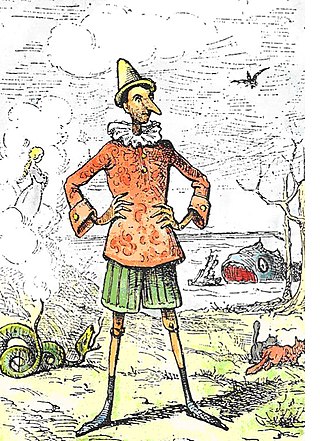
The Adventures of Pinocchio, commonly shortened to Pinocchio, is an 1883 children's fantasy novel by Italian author Carlo Collodi. It is about the mischievous adventures of an animated marionette named Pinocchio, which he faces many perils and temptations, meets characters that teach him about life, and learns goodness before he achieves his heart's desire of becoming a real boy.
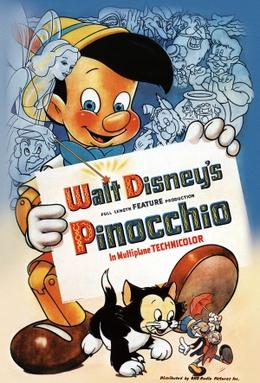
Pinocchio is a 1940 American animated musical fantasy film produced by Walt Disney Productions and released by RKO Radio Pictures. Loosely based on Carlo Collodi's 1883 Italian children's novel The Adventures of Pinocchio, it is the studio's second animated feature film, as well as the third animated film overall produced by an American film studio, after Disney's Snow White and the Seven Dwarfs (1937) and Fleischer Studios' Gulliver's Travels (1939). With the voices of Cliff Edwards, Dickie Jones, Christian Rub, Walter Catlett, Charles Judels, Evelyn Venable, and Frankie Darro, the film follows a wooden puppet, Pinocchio, who is created by an old woodcarver, Geppetto, and brought to life by a blue fairy. Wishing to become a real boy, Pinocchio must prove himself to be "brave, truthful, and unselfish." Along his journey, Pinocchio encounters several characters representing the temptations and consequences of wrongdoing, as a cricket named Jiminy, who takes the role of Pinocchio's conscience, attempts to guide him in matters of right and wrong.

Jiminy Cricket is the Disney version of the Talking Cricket, a fictional character created by Italian writer Carlo Collodi for his 1883 children's book The Adventures of Pinocchio, which Walt Disney adapted into the animated film Pinocchio in 1940. Originally an unnamed, minor character in Collodi's novel who is killed by Pinocchio before returning as a ghost, he was transformed for the Disney adaptation into a comical and wisecracking partner who accompanies Pinocchio on his adventures, having been appointed by the Blue Fairy to serve as Pinocchio's official conscience. In the film, he sings "When You Wish Upon a Star", the Walt Disney Company's signature song, and "Give a Little Whistle".
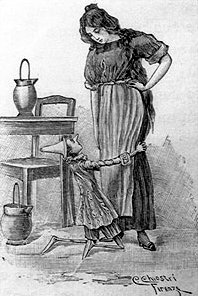
The Fairy with Turquoise Hair, often simply referred to as the Blue Fairy, is a fictional character in the 1883 Italian book The Adventures of Pinocchio by Carlo Collodi, repeatedly appearing at critical moments in Pinocchio's wanderings to admonish the little wooden puppet to avoid bad or risky behavior.

The Fox and the Cat are a pair of fictional characters and antagonists of Italian writer Carlo Collodi's 1883 book Le avventure di Pinocchio. They are depicted as poor con artists who hoodwink Pinocchio and attempt to murder him. They pretend to be disabled: the Fox lame and the Cat blind. The Fox appears to be more intelligent than the Cat, who usually limits himself to repeating the Fox's words.

Pinocchio's Daring Journey is a dark ride at Disneyland in California, Tokyo Disneyland, and Disneyland Park in Paris. Located in the Fantasyland section of each park, this ride is based on Disney's 1940 animated film version of the classic story, which was the studio's second animated feature film. The attraction tells an abbreviated version of the film, with Pinocchio escaping from Stromboli's puppet show and visiting Pleasure Island, ignoring Jiminy Cricket's advice. Monstro the whale makes an appearance, and Pinocchio is finally reunited with Geppetto and turned into a real boy.

Piccolino no Bōken is a 52-episode anime series by Nippon Animation first aired in 1976 which was created in coproduction with the ZDF and ORF. The story is based on the novel The Adventures of Pinocchio (1883) by Italian author Carlo Collodi.

Mangiafuoco is a fictional character who appears in Carlo Collodi's 1883 Italian book The Adventures of Pinocchio, serving as a secondary antagonist turning good.
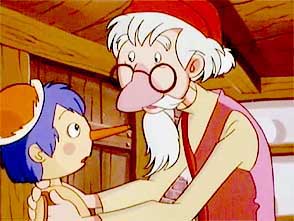
Pinocchio: The Series, also known as Saban's The Adventures of Pinocchio and known as Mock of the Oak Tree in Japan, is a 52-episode anime series by Tatsunoko Production first aired on Fuji Television in 1972, which was edited by Saban in 1990. The story is based on the 1883 novel The Adventures of Pinocchio by Italian author Carlo Collodi.

The Terrible Dogfish is a dogfish-like sea-monster, which appears in Carlo Collodi's 1883 book The Adventures of Pinocchio as the final antagonist. It is described as being larger than a five-story building, a kilometer long and sporting three rows of teeth in a mouth that can easily accommodate a train. So fearsome is its reputation, that in Chapter XXXIV, it is revealed that the Dogfish is nicknamed "The Attila of fish and fishermen".
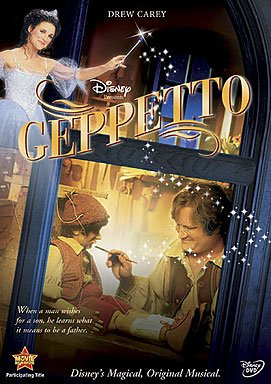
Geppetto is a 2000 American made-for-television musical film based on the popular 1883 Italian children's book The Adventures of Pinocchio by Carlo Collodi starring Drew Carey and Julia Louis-Dreyfus. While not a direct adaptation of the 1940 animated film, it features a few elements such as the character of Figaro, the "I've Got No Strings" song as well as Pleasure Island. It features original songs written by Stephen Schwartz. Schwartz had developed the songs as a reunion for stars Julie Andrews and Dick Van Dyke, but Andrews was undergoing throat surgery so the idea was dropped.

The Land of Toys is a fictional location in the Italian novel The Adventures of Pinocchio (1883) that is disguised as a haven of freedom and anarchy for children, but is eventually discovered to be far more sinister.

Pinocchio is the soundtrack to the 1940 Walt Disney film of the same name, first released on February 9, 1940. The album was described as being "recorded from the original soundtrack of the Walt Disney Production Pinocchio". According to Walt Disney Records, "this is the first time the phrase 'original soundtrack' was used to refer to a commercially available movie recording."

Geppetto is a fictional character in the 1883 Italian novel The Adventures of Pinocchio by Carlo Collodi. Geppetto is an elderly, impoverished woodcarver and the creator of Pinocchio. He wears a yellow wig resembling cornmeal mush, and consequently his neighbors call him "Polendina" to annoy him. The name Geppetto is a Tuscan diminutive of the name Giuseppe.
The Adventures of Pinocchio is a 2007 opera in two acts by Jonathan Dove with a libretto by Alasdair Middleton based on the 1883 Italian novel of the same name by Carlo Collodi. It tells of the creation of the wooden puppet Pinocchio and some of his adventures on the way to becoming a real boy.

Candlewick or Lampwick is a fictional character who appears in Carlo Collodi's 1883 book The Adventures of Pinocchio.
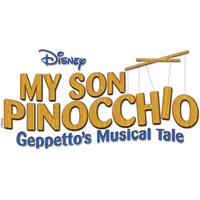
Disney's My Son Pinocchio: Geppetto's Musical Tale is a musical based on Disney's 2000 made-for-television movie Geppetto, which was in turn based on a book by David Stern, and features music and lyrics by Stephen Schwartz. As in the TV film, when Pinocchio runs away to become a star in Stromboli's puppet show, Geppetto must negotiate through a maze of adventures and comic encounters to find him.
"The Stranger" is the 20th episode of the American fairy tale/drama television series Once Upon a Time, which aired in the United States on ABC on April 29, 2012.

The Adventures of Pinocchio is a 1972 Italian five-part miniseries directed by Luigi Comencini, which originally aired weekly on Rai 1 between April 8 and May 6, 1972. Based on Carlo Collodi's 1883 novel with the same name, the miniseries received a large critical success, and had an average of twenty-one and a half million viewers during its first airing. All the episodes together make up 280 minutes of runtime.
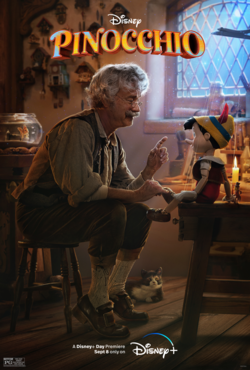
Pinocchio is a 2022 American musical fantasy film directed by Robert Zemeckis from a screenplay by Zemeckis and Chris Weitz. Produced by Walt Disney Pictures, Depth of Field and ImageMovers, this film is a live-action remake of Walt Disney's 1940 animated film Pinocchio, which is itself based on the 1883 Italian book The Adventures of Pinocchio by Carlo Collodi. It stars Tom Hanks, Cynthia Erivo, and Luke Evans in live-action roles, and Benjamin Evan Ainsworth, Joseph Gordon-Levitt, Keegan-Michael Key, and Lorraine Bracco in voice roles. The reimagined story follows a wooden puppet named Pinocchio, who is brought to life by a blue fairy (Erivo) after being crafted by an old Italian woodcarver named Geppetto (Hanks). While the role of Pinocchio's conscience Jiminy Cricket (Gordon-Levitt) attempts to guide Pinocchio in matters of right and wrong, Pinocchio encounters a host of unsavory characters in his efforts to become a real boy.


















